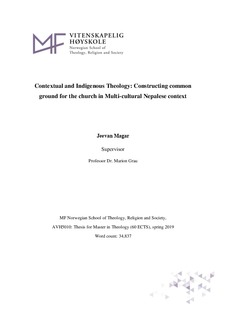Contextual and indigenous theology : constructing common ground for the church in multi-cultural Nepalese context
Master thesis
Permanent lenke
http://hdl.handle.net/11250/2610980Utgivelsesdato
2019Metadata
Vis full innførselSamlinger
Sammendrag
Nepal is not a home for monoculture, ethnicity, and religion but it has varieties of diversity. We can easily imagine that the varieties of languages (123 spoken languages) itself give the clue of the diverse way of revering deities and their worship pattern. However, one thing is common that the majority of people are religious and they are devoted to their gods and goddesses. Also, these people have their cultural practices like traditional dress, (different from other ethnic groups) musical instrument, the way of worshipping gods, celebrating the festival and conducting ceremonies.
In the Nepali Context, as far as people are living in normal life, they do not want to be Christian because becoming Christian is to bear hatred, rejection, isolation and sometimes unexpected persecution too. Why? The only reason is that people consider Christianity is (foreign) religion of others. They imagine that in order to become Christians they must renounce their own culture, lose their own identity, and betray their people. They think becoming Christian is to lose original identity, culture, and tradition.
In this context, the primary question is, how as a church/Christian can we construct an inclusive method (local/contextual theology) for presenting the Gospel giving people a sense of their own cultural identity? Moreover, how the church would create a friendly and homely environment to the people from the diverse ethnic and cultural background?
Constructing local/contextual Theologies is an essential task for the Nepalese Christian community. It is the right time to construct local theology that is suitable in our context. Other hand, the issues of Ethnic identity, national identity, religious identity, and cultural identity has been rising very loudly. Another hand, modern technology, urbanization, globalization, world economic system, migration, and world education system has been pulling the attention of the new generation. In this dichotomy how we formulate Nepalese Christian Theology is challenging at the same time, it is essential to give clear Christian biblical and ethical guidelines by constructing local theology.
Nepal is not only a home for multi-ethnic, multi-linguistic and multi-cultural people; also it is a home for many religions. We need to change seeing all other religions as evil and Christianity as only superior religion. Inter-religious dialogue and interreligious hospitality are essential not only for religious harmony but, it is also for fulfilling the mission of God being involved in the act of love. Nepalese Christian must take the initiative to extend the hearts and hands of hospitality because we are saying, Christianity is the superior and true religion, but Hindus and other religious people are saying, Christianity is foreign religion or religion of west. In this context, Parable of the Good Samaritan (Luke 10:25-37) and dialogue between Jesus and Samaritan woman (John 4:1-42) would be suitable passages to construct the theology of interreligious hospitality and interreligious dialogue.
Becoming a multi-ethnic church, showing the spirit of hospitality and exercising religious tolerance is a vital task of the Nepalese church. An individually as well as collectively as a church we must have a spirit of hospitality and religious tolerance because Christianity in Nepal is the religion of minority and we are living among the pluralistic religious community.
